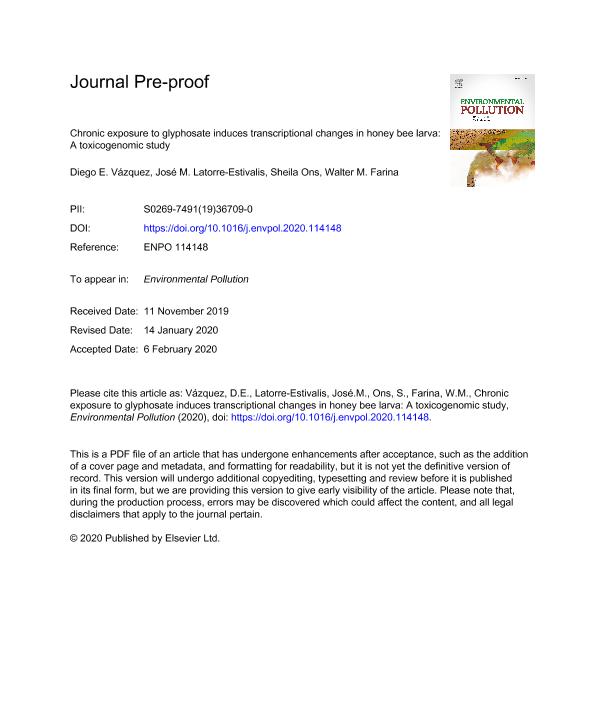Artículo
Chronic exposure to glyphosate induces transcriptional changes in honey bee larva: A toxicogenomic study
Fecha de publicación:
06/2020
Editorial:
Elsevier
Revista:
Environmental Pollution
ISSN:
0269-7491
Idioma:
Inglés
Tipo de recurso:
Artículo publicado
Clasificación temática:
Resumen
The honey bee Apis mellifera is the most abundant managed pollinator in diverse crops worldwide. Consequently, it is exposed to a plethora of environmental stressors, among which are the agrochemicals. In agroecosystems, the herbicide glyphosate (GLY) is one of the most applied. In laboratory assessments, GLY affects the honey bee larval development by delaying its moulting, among other negative effects. However, it is still unknown how GLY affects larval physiology when there are no observable signs of toxicity. We carried out a longitudinal experimental design using the in vitro rearing procedure. Larvae were fed with food containing or not a sub-lethal dose of GLY in chronic exposure (120 h). Individuals without observable signs of toxicity were sampled and their gene expression profile was analyzed with a transcriptomic approach to compare between treatments. Even though 29% of larvae were asymptomatic in the exposed group, they showed transcriptional changes in several genes after the GLY chronic intake. A total of 19 transcripts were found to be differentially expressed in the RNA-Seq experiment, mainly linked with defensive response and intermediary metabolism processes. Furthermore, the enriched functional categories in the transcriptome of the exposed asymptomatic larvae were linked with enzymes with catalytic and redox activity. Our results suggest an enhanced catabolism and oxidative metabolism in honey bee larvae as a consequence of the sub-lethal exposure to GLY, even in the absence of observable symptoms.
Palabras clave:
APIS MELLIFERA
,
ENERGY METABOLISM
,
IN VITRO REARING
,
RNA-SEQ
,
TRANSCRIPTOMIC
Archivos asociados
Licencia
Identificadores
Colecciones
Articulos(CCT - LA PLATA)
Articulos de CTRO.CIENTIFICO TECNOL.CONICET - LA PLATA
Articulos de CTRO.CIENTIFICO TECNOL.CONICET - LA PLATA
Articulos(IFIBYNE)
Articulos de INST.DE FISIOL., BIOL.MOLECULAR Y NEUROCIENCIAS
Articulos de INST.DE FISIOL., BIOL.MOLECULAR Y NEUROCIENCIAS
Citación
Vázquez, Diego Eduardo; Latorre Estivalis, Jose Manuel; Ons, Sheila; Farina, Walter Marcelo; Chronic exposure to glyphosate induces transcriptional changes in honey bee larva: A toxicogenomic study; Elsevier; Environmental Pollution; 261; 6-2020; 1-36; 114148
Compartir
Altmétricas




